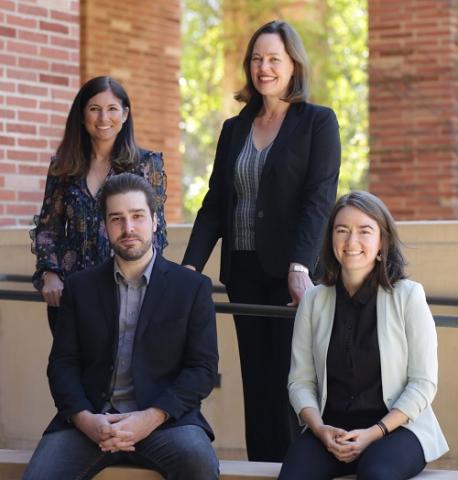Clinic Gains Release of Clients Serving Life Sentences

Thanks to the work of students and faculty of the UCLA School of Law’s Criminal Defense Clinic, two Southern California men serving life sentences in federal prison for non-violent drug convictions were granted compassionate release this year, allowing them to return home to their families.
The clinic’s co-directors, Professor Ingrid Eagly and Lecturer Julie Cramer ’03, worked with the Office of the Federal Public Defender to identify defendants who were eligible for consideration for compassionate release. UCLA Law students worked directly with the clients and their families and conducted the legal research necessary to eventually file the motions in the case. Eight law students —Tucker Atkins ’21, Jenna Finkle ’22, Mara Gonzalez Souto ’22, Christian Gutierrez ’22, Julieta Hernandez ’22, Sandra Hudson ’22, Emily Owen ’21, and Asia Thompson ’21 — worked throughout the spring semester on the clinic’s compassionate release cases.
The victories came at time of significant reform of the federal criminal legal system. The law on compassionate release is not new, but, until recently, compassionate release was a very rare remedy for someone serving an extremely long sentence. “This changed in 2018 with the passage of the First Step Act,” Cramer says.
Before the First Step Act, compassionate release was in the sole discretion of the Bureau of Prisons, which rarely filed motions for compassionate release. To increase transparency and reliance on compassionate release, the First Step Act gives defendants a path to petition directly to the district court for consideration of compassionate release. Under the federal law, a court may grant compassionate release if it finds that “extraordinary and compelling reasons” support a reduction in their sentence.
Finkle, who expects to work in public defense after graduation and argued one of the cases before Judge Consuelo B. Marshall of the U.S. District Court for the Central District of California, says that “the judge considered the commendable rehabilitation of our client during his time in prison, as well as the tremendous support of his entire extended family.” Judge Marshall granted the motion in June 2021.
In July, Judge Virginia A. Phillips, also of the Central District, granted the release of another clinic client who had served 17 years of his life sentence. “We are so pleased that the judge granted our motion, allowing our client to return home to his family and children,” says Petar Nalbantov ’23, who interned with the clinic in the summer and had the opportunity to draft the briefs in the case. “I’ve always wanted to be involved in criminal justice reform, and the work in the clinic was a chance to see the kind of impact I’d like my legal work to have on the world.”
“The advocacy of our students has highlighted the unusually long and unjust life sentences that our clients received,” Eagly says. “Thanks to a series of reforms to federal sentencing law, today someone convicted of the same crimes would no longer serve a life sentence. Compassionate release provides an essential tool by which a judge can take a second look at these sentences and weigh the individual’s rehabilitation and other sentencing factors to provide a more just and equitable sentence.”